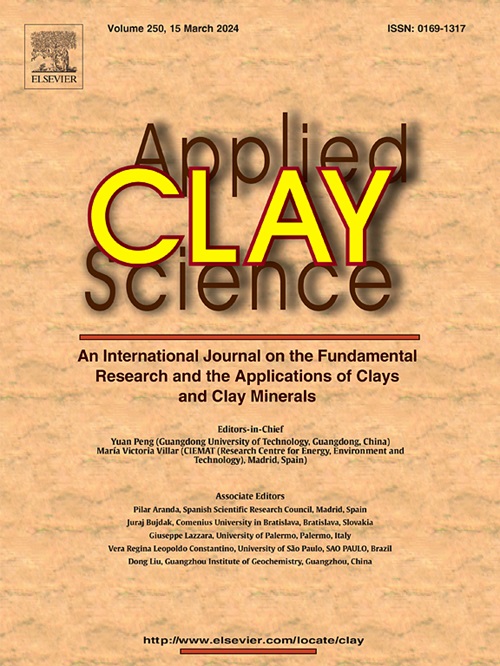Design of deep eutectic solvents modified palygorskite for selective recognition, mechanism study and stable preservation of quercetin
IF 5.3
2区 地球科学
Q2 CHEMISTRY, PHYSICAL
引用次数: 0
Abstract
Considering the effect of secondary metabolites on quercetin (QC) separation and purification in plants, herein, four types of hydrophilic deep eutectic solvents (DESs) composed by organic acids and glycosyl-, quaternary ammonium- or alcohol-based hydrogen bond acceptors were designed and modified on the palygoskite (Pal) surface to improve the selectivity of QC via dispersive solid-phase extraction (D-SPE). The selectivity study followed the following order: Pal- [Choline chloride (ChCl)] [Levulinic acid (Lev)] > Pal- [Glycerol (Gly)] [L-Proline (Pro)] > Pal- [Glucose (Glu)] [D-lactic acid (Lac)] > Pal- [Benzyl triethyl ammonium chloride (BTBAC)] [D-lactic acid (Lac)]. Based on the single-factor method, Response surface methodology (RSM) by using a Box-Behnken design (BBD) was applied to assess the mutual interactions and effects between the three factors and the optimized preparation conditions. The optimal nanoparticles (Pal- [ChCl] [Lev]) showed the best adsorption capacity for QC (29.81 mg/g) in the mixture of methanol and phosphate buffered solution (PBS) and high selectivity which was 1.95 times and 2.12 times that of luteolin and rutin hydrate, respectively. Mechanism exploration indicated that Pal-DESs selectively adsorbed QC via electrostatic interaction, π-π stacking and hydrogen bonds. Furthermore, the screened DES of ([ChCl] [Lev]) could act on QC aqueous solution to improve its solubility and stability during preservation. The proposed QC separation strategy centered on the guiding role of DESs in selective adsorption. Additional alternatives for the synthesis of high-efficiency and hydrophilic functional adsorbents for flavonoids were made available by this green DESs regulation concept.
设计用于槲皮素选择性识别、机理研究和稳定保存的深共晶溶剂改性堇青石
考虑到次生代谢产物对植物中槲皮素(QC)分离纯化的影响,本文设计了四种由有机酸和糖基、季铵或醇基氢键接受体组成的亲水性深共晶溶剂(DESs),并在鳞片石(Pal)表面进行改性,通过分散固相萃取(D-SPE)提高QC的选择性。选择性研究按照以下顺序进行:Pal- [Choline chloride (ChCl)] [Levulinic acid (Lev)] > Pal- [Glycerol (Gly)] [L-Proline (Pro)] > Pal- [Glucose (Glu)] [D-lactic acid (Lac)] > Pal- [Benzyl triethyl ammonium chloride (BTBAC)] [D-lactic acid (Lac)] >。在单因素法的基础上,采用方框-贝肯设计(BBD)的响应面法(RSM)来评估三个因素和优化制备条件之间的相互作用和影响。结果表明,在甲醇和磷酸盐缓冲溶液(PBS)的混合液中,最佳纳米粒子(Pal- [ChCl] [Lev])对 QC 的吸附量最佳(29.81 mg/g),且选择性高,分别是叶黄素和水合芦丁的 1.95 倍和 2.12 倍。机理研究表明,Pal-DES 通过静电作用、π-π 堆积和氢键选择性地吸附 QC。此外,筛选出的([ChCl] [Lev])DES 可作用于 QC 水溶液,提高其溶解度和保存过程中的稳定性。所提出的 QC 分离策略以 DES 在选择性吸附中的指导作用为中心。这种绿色 DESs 调节概念为合成黄酮类化合物的高效亲水功能吸附剂提供了更多选择。
本文章由计算机程序翻译,如有差异,请以英文原文为准。
求助全文
约1分钟内获得全文
求助全文
来源期刊

Applied Clay Science
地学-矿物学
CiteScore
10.30
自引率
10.70%
发文量
289
审稿时长
39 days
期刊介绍:
Applied Clay Science aims to be an international journal attracting high quality scientific papers on clays and clay minerals, including research papers, reviews, and technical notes. The journal covers typical subjects of Fundamental and Applied Clay Science such as:
• Synthesis and purification
• Structural, crystallographic and mineralogical properties of clays and clay minerals
• Thermal properties of clays and clay minerals
• Physico-chemical properties including i) surface and interface properties; ii) thermodynamic properties; iii) mechanical properties
• Interaction with water, with polar and apolar molecules
• Colloidal properties and rheology
• Adsorption, Intercalation, Ionic exchange
• Genesis and deposits of clay minerals
• Geology and geochemistry of clays
• Modification of clays and clay minerals properties by thermal and physical treatments
• Modification by chemical treatments with organic and inorganic molecules(organoclays, pillared clays)
• Modification by biological microorganisms. etc...
 求助内容:
求助内容: 应助结果提醒方式:
应助结果提醒方式:


